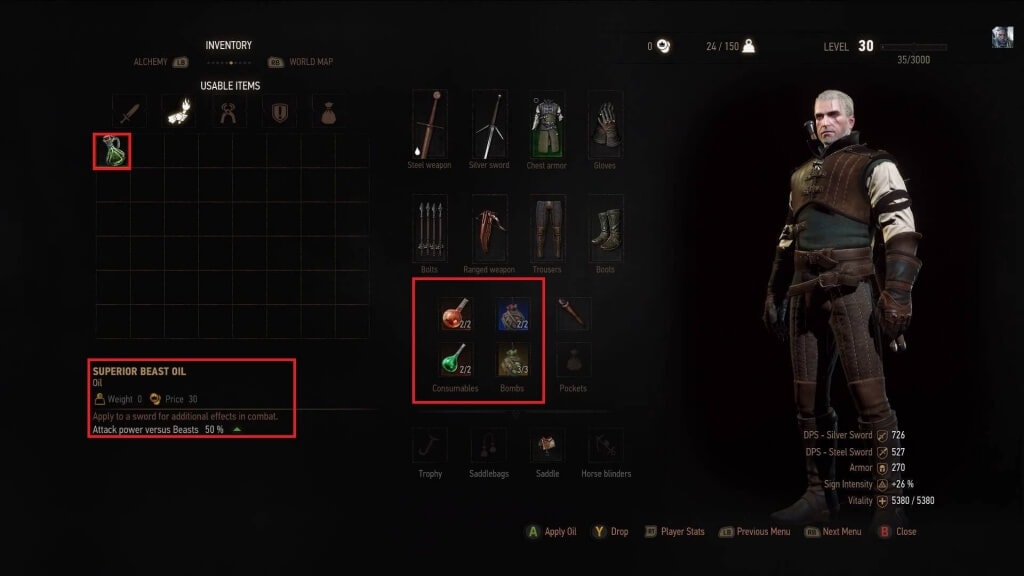Alchemy is a key part of the Witcher series; witchers are masters of crafting not only potions to further enhance their superhuman abilities, but also bombs, weapon oils and other chemical contraptions. In Witcher 3: Wild Hunt, Alchemy is even more important than before.
Alchemy Skill Tree
Your alchemy can be improved through the Alchemy skill tree. Refer to the Skills page for full list of known Alchemy talents. This skill tree has talents that improve the effectiveness of your potions, weapon oils, and bombs, and provides you with new skills such as Poisoned blade, an Oil-type skill that gives you a chance to poison enemies with normal attacks.

Potions
Creating potions requires ingredients, which consist primarily of herbs you can gather the wild and items you loot off monsters. All potions also require alcohol, which can either purchased, looted, or created using your own ingredients.
The ingredients for a specific elixir are then mixed with alcohol to create your potion. It is important to note that once you’ve created a new potion/elixir, you do not need to re-gather the materials when that potion runs out; alcohol is the only ingredient needed to re-fill a potion.
Potions can be upgraded to more powerful versions, and you can have up to 2 potions equipped at a time. This means that you have to be careful about which potions you decide to equip for combat, and which ones you may want to consume before battle.
Different potions also have different durations ranging from seconds to minutes. Consumption of potions increases your toxicity level, which restricts how many potions you can drink, and also have other side-effects.
Known Potions:
- Cat: Grants sight in total darkness. Toxicity: 15. Duration: 240s
- Swallow: Accelerates vitality regeneration. Vitality regeneration pauses for 2 seconds upon taking damage. Toxicity: 20 Duration: 20s
- Thunderbolt: Increases attack power. Toxicity: 20. Duration: 30s
- White Honey: Clears toxicity and cancels all active potion effects
- Maribor Forest: Increases adrenaline generation. Toxicity 20. Duration 30s
- Tawny owl: Increases endurance regeneration. Toxicity 20. Duration 30s
Decoctions
Decoctions are a new potion type which have much more powerful effects. These potions last a long time (30 minutes) and cause 100% toxicity upon consumption. Every decoction requires a Mutagen to create, and they cannot be re-filled like normal potions.
Known Decoctions:
- Grave Hag: Each slain enemy accelerates vitality regeneration for duration of the battle. Toxicity +100%. Duration: 1800s.
- Arch Gryphon: Strong attack uses whole endurance bar, but after dealing normal damage enemy health points are reduced by 10%. Works only when endurance is above 0. Toxicity +100%. Duration 1800s
- Water hag: Increases damage dealt, while vitality is at maximum (100%). Toxicity +100%. Duration 1800s.

Oils
Oils are items that can be applied to the Witcher’s weapons, typically increasing damage done versus a particular monster type. Oils can be upgraded just like potions and expire after a given amount of attacks with your weapon.
Bombs
Bombs can be crafted by using specific materials, and used in combat in one of 2 ways: either with a hotkey to throw them directly at the enemy, or go into “slow-aim” mode which slows down time and allows you to aim where you want to throw the bomb. Similar to potions, Geralt can only equip up to 2 bombs at a time.
Known Bombs:
- Devil’s Puffball: Releases cloud of poison. Duration: 10 seconds. Poison damage +100
- Grapeshot: Inflicts shrapnel damage to foes within it’s explosion radius. Deals small amount of fire damage. Destroys monster nests. Physical damage +350. Silver Damage +350, Fire damage +5
- Samum: Blinds opponents within it’s blast radius. Destroys monster nests
- Dragon’s Dream: Releases a cloud of flammable gas which causes a destructive explosion when ignited (e.g. with Igni)
And to close off, here’s a video which explains Alchemy: